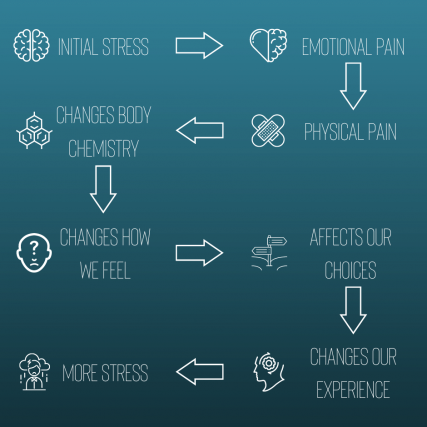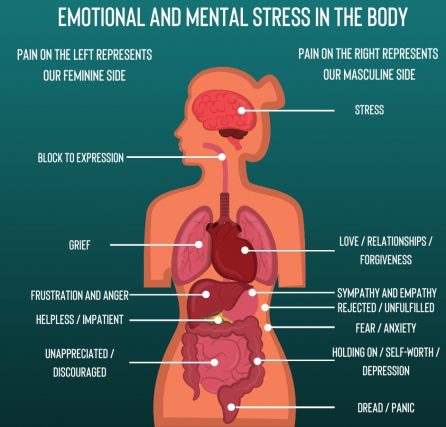If you began to carry a bag of rocks around all day it’s going to cause pain, the same goes for stress! If you have a build-up of unprocessed emotions you’re unwittingly carrying around a mental and emotional weight. Daily stress that isn’t resolved builds up over time, manifesting as acute and chronic physical pain. Thankfully there are ways to deal with the natural mental and emotional stresses we encounter through life and prevent a build-up and its resulting physical pain.
In this post I will explore the relationship between stress and pain, how it manifests in our body and what we can do to prevent and release built up stress and emotions including the following topics
The relationship between stress and pain
Physical symptoms of stress in the body
The link between stress and posture
What organs are affected by stress
Emotional pain causing physical pain
Releasing stress stored in the body through kinesiology
The relationship between stress and pain
We’ve all heard of stress headaches. The same process of physical pain from mental or emotional stress exists across the body. When we experience acute stress it triggers the fight or flight response which releases adrenaline and cortisol into the blood vessels to help the body respond quickly to the situation at hand. In prolonged stress situations, particularly when the environment is a contributing factor, this natural reaction can become problematic.
Where stress is the cause of physical pain, it’s not so much what the constant stress is doing to the nervous system but what the nervous system is doing to the physical body. When the body is continually triggering an acute response from repetitive emotional mental stressors, the body’s energy system becomes drained and the physical body tense, tired and exhausted.
Pain is a signal that the brain sends to an area of the body to let the consciousness know there is a problem. Our society teaches us to suppress these important signals with pain blockers (paracetamol etc). While these drugs allow the body to heal the acute inflammation of pain response, (and at times are required), they fail to address the underlying problem and cause of the pain. When there is no longer pain, often we believe that the problem is then fixed. In my experience the core issue is still left unresolved, so unfortunately the pain will be back at a later date.
When we can identify a person’s stressors we often uncover an associated pain. Everyone experiences different levels and types of stress in their daily lives. If a client has pain in their body, Kinesiologists will look for the source. For example, if a client’s pain is a result of work stress, maybe the cause is not being able to reach out and ask for help due to feelings of fear that they will be ignored or unsupported. To deal with the core issue causing this pain we would focus on improving self-confidence and creating healthy boundaries in the workplace.
The cycle of pain is repetitive, more stress causes more pain and more pain causes more stress! If we are unable to find our way out of this cycle, living in a survival mode can become the new normal. The best way to get out of this cycle is to resolve the cause.
Physical symptoms of stress in the body
Stress can negatively affect systems across the body including muscle tension, headaches, breathing patterns, digestive issues and many more. When we experience stress the nervous system reacts. Your muscles tighten up, blood pressure rises, heart rate increases, breathing quickens, and your senses become heightened. This natural reaction is designed to protect us from a perceived threat or danger. As humans, we are programmed to protect ourselves against emotional, mental and physical stresses. The body does not differentiate between real tangible stress or emotional/mental stress.
When this reaction is triggered too often it can put significant strain on the body leading to long term health problems including chronic pain, risk of heart attack and more.
Hugo Tobar founder of the NK Institute of Neuroenergetic Kinesiology is someone I’ve personally learnt a lot from in this area and been inspired by. Check out his video Stress and Emotion and what we do with it for some great insights

Stress-induced muscle tension
When the mind is stressed from thinking you can almost guarantee the body is stressed too.
Stress contracts muscles as a normal reaction to protect itself. If there is a constant stream of stress the muscles will stay contracted and cause pain in the neck, shoulders, back etc
Try this simple exercise for yourself. Take a moment to become aware of your shoulder and or neck tension the next time you feel stressed. Feel your shoulders, have they raised and become tense since the stress started? If so, you have just experienced stress-induced muscle tension. If you can become more aware of how stress creates tension and aim to work through this tension at the time of stress you can ultimately avoid lots of long term stress, pain and confusion as to how it all started.
Dehydration caused by stress
Our bodies are very efficient and will use all the resources available to them to regulate physical, emotional and mental stress. Hydration is a crucial component to success in overall wellness.
When the mind is in a stress state, the body is using more fluids to attempt to regulate itself. If you’re not meeting these increased demands then the body will no longer be properly hydrated, adversely affecting its natural systems.
As the body becomes depleted of enough water, common symptoms will include dry lips, dry mouth, feeling thirsty, lightheaded, brain fog and tight or tense in the physical body. The body will react by sending more water to areas that need it to help regulate.
When the whole being is overworked and suffering from insufficient water and nutrition, it will of course keep working, but without the fluidity of hydration, the body will become weak and move into the first stage of exhaustion. This is what can cause stress headaches, back pain, restless legs and pain in the back where the liver and kidneys are.
I hear some people say they drink less water, not more when they’re stressed. This adds to the problem as, during high levels of stress, hydration is one thing that needs to become a priority. If you don’t like the taste of water, an easy fix is to change the water source to a filtered system (I use the Zazen system in the clinic and at home), another option is to buy Pureau box water from woollies You could also consider adding lemon or mint to the water or drinking organic herbal teas, anything to make sure you’re getting the right amount of water daily.
Carrying stress in the back, shoulders, neck and head
One of the most common negative effects of stress on the body is pain in the back, shoulders, neck and head. When we experience stress the large muscles in our shoulders and back tighten and this is where it begins. Think about what your shoulders carry: Your head, weighing in around 5 kg.
As your shoulders and neck become tight and tense from stress it becomes more challenging to carry your head! Of course, your neck connects to your stable spine, so if you get tension in the neck it will likely tighten the muscles of the upper spine. If this tension isn’t resolved then more and more muscles start to overcompensate in an attempt to support the upper neck and shoulders area. Headaches and pain in the Jaw are common results of this tension

Stomach pains due to stress
In Kinesiology we look at the relationship between muscles, organs and how certain emotions impact them. Issues with the stomach often relate to worrying and being indecisive about something important. Stomach pain often triggers when there is deep concern about another person, self or a situation that is unresolved. Feeling sick to the stomach when you think about something can be the result of this type of stress. Most of us have experienced some form of stomach discomfort when nervous or over analysing something. This is completely natural, yet if we’re experiencing this kind of stress too often and the reactions become more severe it can become a problem.
When we experience these types of stress our bodies are pumped with adrenaline causing the bodies functions to go into the fight or flight response. This can cause problems with digestion, the ability to procreate and diminishes the body’s ability to absorb nutrients from our food. Along with this, dehydration is another common reaction that can seriously impede the body’s systems. Couple these with diarrhea and potentially vomiting and you have severely depleted the body’s resources.
Jaw pain due to stress
A tight Jaw can cause pain in the jaw, neck muscles and in many other areas of the body. When stress rises, especially frustration or anger the jaw clenches. This is a part of our innate protection mechanism as humans as the jaw is the master structure of defence.
When the jaw is clenched for extended periods of time from stress it can cause headaches, migraines, neck tension, shoulder and back pain. When stress is prolonged the jaw can keep hold of these frustrations resulting in grinding the teeth while sleeping. When people wake from sleep they can feel tired upon waking and feel pain in the jaw from grinding overnight. The best way to relieve this pain is to find the core issue causing the initial clench. This may be prolonged stress at work, home or social anxiety.
Effects of stress on breathing
When we experience stress or powerful emotions, our breathing patterns change. This can include experiencing shortness of breath, rapid breathing, shallow breathing, hyperventilation or holding of breath. Breath can also play a role in the holding of emotions while under intense stress. All of these stressful breath patterns add to our stress and block the ability to calm our-self.
Being aware of your breath in times of stress is powerful, as breath has the power to soothe and release stress. Anxiety can become much worse when breath becomes rapid and emotions become high. If prior to this rise of energy a person having this experience can see the signs and regain control of their breathing they can often self settle.
I highly recommend meditations by Dr Joe Dispenza to help relieve stress as his meditations work with the power of the breath. He offers a lot of information on his YouTube channel and you can also check out his meditations here.

The link between stress and posture
When we go through particularly shocking events the stress we experienced can be held in our body via our posture. For example, if a person has a car accident, the shock of the event can be locked into the posture that the person was in during the car accident. In this example, it would be a sitting position. The stress held in the body from the accident can trigger when the person is just sitting on a chair at home in a safe environment because the shock is now locked in that posture.
Lots of people come to me after many disappointing attempts to relieve their pain, completely unaware that a traumatic event could be locked into a structure, and affecting their posture. In these cases, I use a very specific Kinesiology technique to clear the posture from the time of the event. If there is a link between stress and posture, this technique unlocks the stress from the posture so you have more freedom in the physical body.
What organs are affected by stress
How the body reacts to stress is completely individual. While all organs can be affected by stress, some of the most common I see in the clinic are the liver, stomach and large intestine.
A client just asked me a question relevant to this recently about why when she’s stressed does it always affect the large intestine. My reply was that it might be, for lack of a better word to describe it, her ‘weak spot’.
Let me explain, most of us have an organ or body system that when we’re feeling run down becomes sluggish or acutely painful. Whether it’s low digestive enzymes in the stomach or the large bowel lagging, the gallbladder not processing fats efficiently, or the liver having challenges in one or more of the detox pathways.

Emotional pain causing physical pain
Mental and emotional stress are often overlooked as causes or components of physical pain in the body. This is because when we’re in pain, it clouds our ability to think about what we were doing and how we were feeling at the time it started. Only with hindsight can we uncover this information
When we experience a roller-coaster of emotions we often experience physical pain as a result. A common example is the beginning of back, shoulder or neck pain when you’re stressed at work. This physical pain changes the way we feel and can make a huge impact on our life. Stressful times can impact our core values and beliefs, and if beliefs are altered then life changes.
Emotional pain can impact us in many ways and physical pain is just one aspect of this. It’s important we keep the link between emotional and physical pain in mind while assessing our pain. A Lot of the times that can give us the answer or at the very least a clue to what the pain links to.
Evette Rose, author of the amazing Metaphysical Anatomy, states that:
“These conditions can be activated by circumstances in your present life, your ancestry, conception, womb, birth trauma, childhood or adult life.”
Releasing stress stored in the body through kinesiology
Something that has been reinforced to me over the years as a kinesiologist is that everything that we are (mental, emotional, physical) is linked. The benefit of this knowledge is that when you can address the core issue, the client has the potential to heal everything that the issue links to.
Our core issues always have an emotion connected to them. Time and time again I’m shown this in the clinic. When this core emotion is found, it’s like everything that was so tightly wound around the emotion releases and everything calms and settles again. This experience is so profound that when people experience this clearing for the first time it almost feels unreal.
Kinesiology enables us to identify these core issues and gives us the techniques to clear and restore the body to its natural equilibrium. When a client comes to see me complaining of a sore back, caused by muscle tension, caused by stress I do not directly treat the pain, I treat the core issue and its attached emotions. You do not kill the weed in the garden by plucking off its leaves, you must pull it out by the root to stop the overgrowth.
“We all have our own personal limits — whether they are related to our ability to create abundance in our life, our capacity to make some type of change in our health or our body, our inability to stop recreating the same outcomes, or just our ability to believe in ourselves. When we step beyond our limitations, we become more unlimited.” – Dr Joe Dispenza

Are you suffering from chronic pain caused by stress?
If you’ve been living in pain and can’t seem to find an answer, I truly hope this post has been helpful for you. When we can determine the origins of our pain we have a much better chance of dealing with and moving on from it. Pain is the ultimate obstacle to living the life you dream of, the life you deserve!
If you, a loved one, a friend or a coworker are experiencing pain as a result of stress, kinesiology can help you. I wholeheartedly encourage you to share this post with anyone who could benefit from kinesiology or having a greater understanding of this work.
Please leave a comment and share – Thank you!
You can BOOK a kinesiology session Monday to Wednesday’s in my clinic in Crows Nest, Sydney Australia!

About the Author

Janette Harris is a certified Kinesiologist, mentor and the founder of the Sydney based Kinesiology clinic, Inspire Freedom. With over 10 years of experience and extensive qualifications across a range of Kinesiology modalities, Janette is passionate about helping her clients overcome their emotional, mental, physical, nutritional and energetic challenges.




